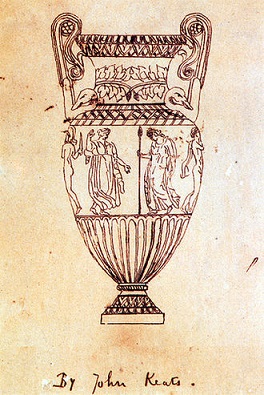JINGLES THAT JANGLE

Courtesy of wikipedia.org
Percy (One)
Our new dog, named for the beloved poet,
ate a book which unfortunately we had
Left unguarded.
Fortunately, it was the Bhagavad Gita,
of which many copies are available.
Every day now, as Percy grows
into the beauty of life, we touch
his wild curly head and say,
Oh. wisest of little dogs.”
∞
Retirement brings out the poet in many folks and I applaud the transformation. Contemplating and writing are the jewels in our crown. Poetry, to my mind, is the most challenging endeavor. Ask me why I honor the poet John Keats above the novelist Herman Melville, and I will answer the poet bounds life in a nutshell, compressing thought into an essence that a Grecian Urn can contain. Melville, in contrast, requires hundreds of pages to reflect the same idea.
Exposing the essence of things is art’s work. As in science, those who manage it succinctly are geniuses. Albert Einstein used symbolic language to craft one of the greatest poems of all time. E=MC(2) His formula is proof positive that art and science have the same genesis.
I seldom dabble in poetry. I have too much respect for it, though as a writer I honor the common principle that less is more. All else is verbal diarrhea.
The poet Ezra Pound endeavored to be spare. To describe people emerging from a transit station on a dank day he wrote, petals on a wet, black bow. More than a description, he includes the tactile, juxtaposing softness with rigidity…softness with the mechanical. In four words, he reveals the complexity of human essence. Born of earth’s elements, we are capable of unique invention.
No, I am no poet.
As a college freshman, I read an essay by Bernard Berenson, a literary aesthete whose opinions at the time I thought were smug. Yet, one of his predictions stayed with me. Modern art and culture were descending into mediocrity.
He died in 1959, the year I graduated and as I am now 88, my opinion has aligned with his. Are the pair of us guilty of nostalgia? Or, having lived an arc of time, do we, like astronauts, have a wider vision of the horizon? I suspect it is the latter and had we met today, Berenson and I would have giggled over Andy Warhol.
Like Warhol, modern poetry seldom fills me with wonder. Shorn of imagery, it looks like lazy text, lines snapped apart as if they were dry twigs, and the damage laid in a pattern to disguise prose. Take any line from the poem that opens this blog and we find a simple, sometimes ungrammatical statement swimming in a surfeit of words.
Our new dog, named for the beloved poet, ate a book which unfortunately we had left unguarded.
I might have written, Our puppy Percy, named after the poet, ate an unguarded book. Both sentences contain the same information. The difference is that Mary Oliver won a Pulitzer Prize.
Growing old allows for many comparisons, which explains why the elderly are seldom astonished–though some do cultivate ignorance as if it were an attribute. Politicians do the same. Intent upon matching their views with those of their constituents, an observer might find it difficult to deduce who is influencing whom, particularly when the rhetoric feels coarse as sackcloth.
I find nothing to admire in sackcloth. I prefer beauty and chose to follow Keats’ compass. It takes me to the crossroads where truth also stands, a point of revelation.
When Kamala Harris debated Donald Trump, she tried to speak the truth but was it revelatory? We will know come November. Nonetheless, I suspect her words to the former President, being both true and simple came near to poetry.
They say you
are
a disgrace.
